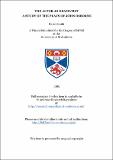Files in this item
The actor as dramatist : a study of the plays of John Osborne
Item metadata
| dc.contributor.advisor | Parry, P. H. | |
| dc.contributor.author | Smith, David | |
| dc.coverage.spatial | 243 p. | en_US |
| dc.date.accessioned | 2018-07-10T08:59:52Z | |
| dc.date.available | 2018-07-10T08:59:52Z | |
| dc.date.issued | 1985-07 | |
| dc.identifier.uri | https://hdl.handle.net/10023/15156 | |
| dc.description.abstract | This thesis examines John Osborne's work in the light of his experiences in the theatre prior to his rise to fame as a dramatist and also as a working actor during the greater part of his career as a dramatist. The thesis deals with Osborne's work both for the theatre and for television, but excludes those texts which have been published but remain as yet unperformed. It concentrates upon his original plays and with the exception of A Bond Honoured it does not discuss his adaptations of the work of other authors. Chapter One of the thesis serves as an introduction to the arguments to follow, using elements of Osborne's biography as a basis. The second chapter examines the contention that the world of the theatre is a major factor in the setting of some of his more important plays. The Entertainer is cited as the most obvious example in this regard, but it is argued that a similar use of the theatre can be identified in Epitaph for George Dillon, Time Present, The Hotel in Amsterdam, and latterly in You're Not Watching Me, Mummy. In addition, Chapter Two examines the less obvious elements of theatricality which can be identified in The World of Paul Slickey, Luther, Plays for England, Inadmissible Evidence, A Patriot for Me, A Bond Honoured, West of Suez, A Sense of Detachment and the later television plays, the main thrust of the argument being that, although not overtly of the theatre, a great deal of theatrical devices and references lie within the subtext of the plays, deriving from the author's long association with, and his obvious affection for the theatre. Chapter Three argues that Osborne's close ties with the theatre lead to his populating his plays with theatre people: with actors. This is clearly to be seen in Epitaph for George Dillon,The Entertainer and Time Present where the leading characters are actors by trade. However, the discussion is extended to cover the majority of Osborne's major plays wherein the leading characters can be identified as actor-types, displaying many of the attributes of the professional actor except the job itself. Notable in this regard are Jimmy Porter, Luther, Bill Maitland and Alfred Redl. The fourth chapter examines Osborne's frequent use of homosexuality, both explicit and implied, as a dominant trait of his major characters. It is argued that as actors or actor-types the characters display an ambivalence which is often realised in sexual terms. The most obvious example is to be found in A Patriot for Me. but a great many of Osborne's major characters, for example Archie Rice, Jimmy Porter and Laurie, display a degree of sexual ambiguity which provides a common theme. Finally, in an appendix to the thesis, there is a collection of press criticism of the first performances of Osborne's plays together with details (where available) of the first performances. | en_US |
| dc.subject.lcc | PR6029.S39Z5S6 | |
| dc.subject.lcsh | Osborne, John, 1929-1994--Criticism and interpretation | en |
| dc.title | The actor as dramatist : a study of the plays of John Osborne |
This item appears in the following Collection(s)
Items in the St Andrews Research Repository are protected by copyright, with all rights reserved, unless otherwise indicated.

